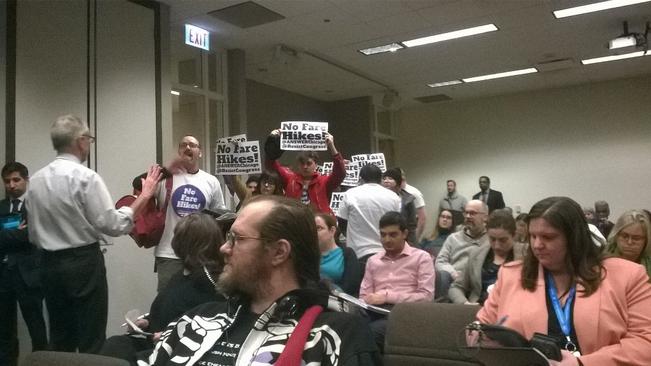CTA OKs New Fare-Paying Plan Despite Questions
Jon Hilkevitch
Source: Chicago Tribune
Created: March 14, 2013
CTA board members grappled to understand the intricacies of the new Ventra fare-payment system Wednesday, as bus and train riders will undoubtedly do when it is launched this summer.
The board then unanimously approved new fees embedded in the Ventra program, which was announced six months ago with the promise of no cost increases.
CTA train riders who purchase a disposable single-ride paper ticket will pay $3, which represents a 33 percent hike in the $2.25 base rail fare. The CTA bus fare will remain at $2.25 for cash payments and $2 if a transit card is used.
Most, if not all, of those paying 75 cents more per train ride will be people who buy the single-ride ticket using cash, instead of the new contactless Ventra card that the CTA is promoting as a replacement to the popular Chicago Cards.
Ventra, a dual-use transit and all-around debit card, will also be accepted on Pace, the suburban bus system. CTA and Pace riders will have the additional option to pay fares using personal credit or debit cards for the first time, officials said.
The CTA said it expects that most of the riders who buy the $3 single-ride rail ticket will be visitors from out of town. The same rationale was used recently to defend a proposed increase — to $5 from $2.25 — in Blue Line rail fares for passengers boarding at O'Hare International Airport. The hike to $5 at O'Hare has been delayed until July because of protests from airport workers and others.
At a public hearing on the new Ventra-related fees this week, CTA riders complained that many poor people will end up paying the $3 rail fare for a single-ride ticket because they tend to use cash, cannot afford to use a Ventra card and don't own credit or debit cards.
CTA President Forrest Claypool said anyone who pays $3 will choose to do so because there are ways around it. He bristled at the characterization by many critics that cash-payers are being penalized under the new open fare system.
"There is no $3 cash fare,'' he said. "The $3 is if a person chooses a disposable, one-ride ticket. It has nothing to do with cash.''
Claypool tried to convince CTA board members that the CTA's half-billion-dollar investment in the Ventra system doesn't have to cost riders a nickel more — if they are savvy consumers.
By that, he meant spending $5 to obtain a Ventra fare card; registering the card to turn the $5 payment into a $5 fare credit; and putting money on the card to maintain enough of a balance to pay for transit fares as well as the optional Ventra MasterCard debit card account that enables use of the card for retail purchases at stores and on line.
"Nickel and dime. Nickel and dime. It is the one true thing Chicago is good at. So they have a $5 fee, but you get your money back right away. Why even have it?'' said Matthew Blume, who works downtown as a corporate account manager.
CTA board Vice Chairman Jackie Grimshaw said the new system is very complicated and she expressed concerns that it will confuse and frustrate many riders.
Board members Kevin Irvine and John Bouman said it appears that social service agencies that purchase single-ride tickets from the CTA to distribute to clients will end up paying more under the Ventra system.
Claypool maintained that's not necessarily so, but CTA chief planning officer Rebekah Scheinfeld only promised that the CTA would work with the social service agencies to help keep their costs down.
Many sophisticated commuters will likely go the Ventra route suggested by Claypool, as they have in using the existing two versions of the Chicago Card, which will be phased out in 2014.
But if Ventra customers fail to register the card within the required 90-day window, they forfeit the $5 credit to the CTA. Customers must provide the CTA with their name, address, phone number and the Ventra card number in order to register the card.
In addition, Ventra card owners who do not use the card for 18 months will have $5 deducted from their accounts each month until all the money is depleted or they use the card at least once to restart the 18-month clock.
The $5-a-month penalty is intended to encourage frequent use of transit, officials said. But frequent use also favors the companies under contract with the CTA on Ventra because the companies receive a fee for every fare transaction.
The Tribune requested a breakdown of the revenue the CTA stands to receive from the new fees, but officials said those numbers were not immediately available.
The Ventra system is expected to save the CTA $50 million over 10 years by reducing costs associated with fare-payment and processing, maintenance of fare equipment and handling cash, CTA spokesman Brian Steele said.
In separate action Wednesday, the CTA board approved a 32 percent increase for the University Pass, which provides unlimited rides on CTA to more than 130,000 college and university students in the CTA service area.
The increase, to take effect in the fall, works out to $15 per student per semester, costing the schools a total of $1.07 a day per student, up from 81 cents, officials said. The University Pass cost is added to tuition fees at 52 participating schools, officials said.
Citizens Taking Action
for transit dependent riders
Member of Citizens Taking Action wait in line to speak at public hearing on new open fare features.



